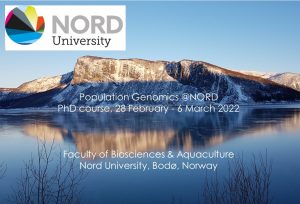Dates: 21st – 25th February, 2022
Location: North University, Bodø
Course responsible: Joost Raeymaekers
Registration: Closed. This is done directly to Nord University. Please click here to visit their course page for registration and updated information.
Lecturers:
Joost Raeymaekers, Lars Martin Jakt, Irina Smolina, Alexander Jüterbock, Britta Meyer, Mark Ravinet, Emiliano Trucchi, Oscar Gaggioti, Bart Peeters, Anja Westram, Kostas Sagonas
ECTS: 5
Evaluation: The evaluation will be report-based. The students will analyze a population genomic dataset (preferably their own data or data related to their own research topic), interpret and write a report. The students deliver the report within a month after the end of the course.
Course description:
The 2022 course in Population Genomics at Nord University is held in Bodø from 21st to 25th February, 2022. It brings together an international collection of lecturers and course participants to study techniques for the analysis of population genomic data. The course consists of a series of lectures, demonstrations and computer laboratories that cover theory and practice of population genomics analyses. Topics include population genetic theory, introduction to command line, data formats, coalescence/population demography, analysis of population structure, adaptive evolution and inferring selection, gene-environment interactions, landscape genomics, and the analysis of admixture/hybridisation. Both understanding theory and acquiring the skills to analyse data are part of the learning outcomes. There will be a local support team with teaching assistants.
Course program:
This is an intensive one-week course with lectures (including discussions) and hands-on exercises, Monday to Friday, 9-17, with 1 hour lunch break. About half the time will be devoted to lectures, and the other half to exercises. Lectures and exercises are 35 hours in total, and self-study is estimated to 30 hours. Preparation time for written report (home exam) is estimated to 35 hours. The total workload is thus about 100 hours.
The plan of the five days, with two sessions per day, is as follows:
- Session 1: welcome, practicalities, course introduction
- Session 2: introduction to command line (unix), data formats and data conversion
- Session 3: introduction to R
- Session 4: population genetic theory
- Session 5: analysis of population structure
- Session 6: population history, demographic inference, coalescence
- Session 7: genomic basis of adaptive evolution and inference of selection
- Session 8: admixture and introgression/hybridization
- Session 9: landscape genomics, gene-environment correlations
- Session 10: Open lab and introduction to the home exam
Students bring their own laptops with the last version of R and RStudio installed. Some R packages will also be needed. The students will receive a reading list and software installation instructions before the start of the course and are expected to prepare well.
Learning outcomes and competence
After having completed the course, the students should:
Knowledge – have acquired in-depth understanding of topics, theories, processes, tools and methods used in population genomics.
Skills – have acquired the tools and abilities to conduct population genomic analyses, including data quality control, analyses, and interpretation of results.
General competencies – 1) be able to exchange views and experiences with evolutionary and molecular biologists and contribute to the development of good practice; 2) develop an understanding of modern scientific research in population genomics.
Prerequisites
Basic knowledge of genetics and statistics. Prior experience with command-line programs (in particular R/Rstudio) or Unix will be an advantage.
